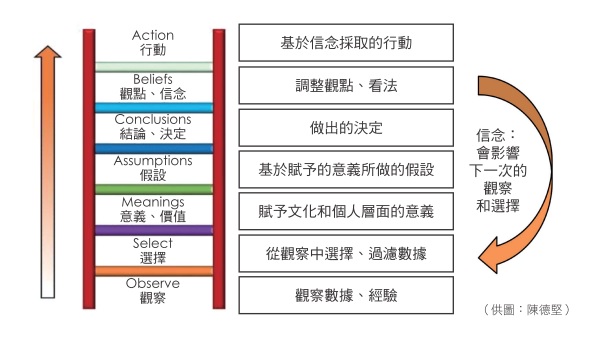Lead others to build their lives and become an encourager
【Heavenly Leadership】Series 3
Oral narration/Chen Dejian‧Compilation/Lin Minwen

Leadership is influence. After discovering the meaning of life, you must lead yourself on the path to living out your life calling. This journey of life is not easy, and we need mentors and helpers who encourage and guide us, namely the angels of love. If we are willing to create change from within and then manifest it externally, we can also become such encouragers and make an impact.
When you think of “leadership,” what image comes to mind? Is the leader walking in front and the led following behind? So once the leader is gone, how do the led move on? Jesus’ leadership of the disciples did not end after He ascended to heaven; even without Jesus’ guidance, the disciples were still carrying out their missions under His leadership.

▲On the road to living out the calling of life, the role of the leader is to accompany, support, and encourage.
"Leading" is not about controlling, but building up - building up the people being led so that their lives can grow and they can live out their calling. This is the key word of the third stage of leadership. The ultimate goal of the building is to hope that the led person will become the next leader, continue to encourage and influence people, live out the wisdom, righteousness, holiness, and redemption of Christ, and be full of the stature of Christ's maturity. Professor Warren Bennis, known as the "Father of Leadership," once said, "Becoming a leader is synonymous with becoming yourself." (Becoming a leader is synonymous with becoming yourself.) Therefore, live in the eyes of God. The true self is a leader.
This article will explore how to build others up from the role, vision, and model of a leader and become the encourager you and I hope for.
Best Supporting Actor, Servant Leader
Have you ever participated in a tour group? Or have you seen a local tour guide taking a group tour to a scenic spot? In the new place, all the group members got on the bus and headed to the scenic spot. This was a route planned in advance by the tour guide and an itinerary that all group members were willing to participate in. After arriving at the destination, the tour guide who is familiar with the local customs, culture and history will introduce it in detail and recommend several spots worth spending more time to stop and appreciate. Then there are free activities. The group members follow the information provided by the tour guide to explore and enjoy the beautiful scenery and delicious food on their own. Through travel experience, group members have a clearer understanding of the place, leaving behind beautiful memories, stimulating their love for traveling, and being able to invite friends to travel again in the future.
The tour guide is the leader of the tour group, but a good tour guide only plays the role of supporter, making the group members the protagonists of the trip. Reaching scenic spots is not the purpose of travel. It is the greater gain of travel to allow group members to enjoy the experience and be inspired to recommend it to others.
A good tour guide usually: likes to travel; is familiar with routes and scenic spots; and is willing to share the beauty of travel. Leaders with heavenly leadership also like to live out the journey of meaning in life; they know the value of others’ help to them; they are willing to share God’s actions in life, and hope that others will be inspired to find meaning and live out their calling. Such leaders are “servant leaders.”
Among the Biblical characters famous for "encouragement", Barnabas is the most popular; his alias "Son of Encouragement" is even better than his real name Joseph. When other disciples were still suspicious of Paul, Barnabas took the initiative to accept this "former persecutor of Christians", introduced him to meet with the church leaders in Jerusalem, endorsed him, and started Paul's ministry.
As the church in Antioch grew, Barnabas found Paul to serve and build the church together, paving the way for subsequent missionary journeys. For Mark, who fell for a time, Barnabas did not hesitate to fight with Paul and even parted ways. Mark was encouraged, built up, returned to the service, and eventually became a helpful co-worker to Paul.
The Bible mentions the missionary partners Barnabas and Paul. At first Barnabas's name was put first, and later Paul's name was put first. From this detail alone, we can see that after Barnabas led Paul to a certain stage, he played the role of a supporter and supported Paul in living out his life calling.
With the eyes of grace, see what the Lord sees
Could it be that Barnabas’ “consolation” was just words of appreciation and affirmation? What did he see in Paul and Mark that made him willing to go out of his way to accompany and build up people who others did not think highly of? Among the 12 disciples called by Jesus, which one fits the model of the ideal leader in everyone’s mind? What did He see in these ignorant people, and He even entrusted them with the mission of establishing churches and spreading the gospel?
Leaders need to see the value and strengths of people, even if they have to pay a price. But how can one have such a vision?
Chris Argyris, a professor at Yale and Harvard University, proposed the "Ladder of Inference" theory, which explains how people can selectively assign meaning step by step from observed facts and data, plus their own experiences. And make assumptions, draw conclusions and decisions, and form opinions and beliefs that become the basis for action.

(Photo courtesy: Chen Dejian)
"Seeing is believing", is this really true? Aren’t we all wearing filters and seeing so-called “facts” that are either one-sided or distorted? Aren’t the assumptions and conclusions made based on biased “facts” coupled with selective interpretations likely to be biased and discriminatory? Many times, we find it difficult to encourage others because we have put on the old man/worldly filter and see more shortcomings than advantages. After Christians are born again, they should take the initiative to put on a new filter of Jesus, which is the lens of grace. When they see people and things, the results will be completely different.
The "ladder of inference" is more than just "putting yourself in someone else's shoes." Before thinking about it, we have unconsciously selected and filtered the data based on the filters in our minds. If you want to truly understand each other, you need to "observe from others' perspective." What we see is filtered by inner values and meanings and becomes subconscious assumptions. Through decisions in the heart, beliefs are strengthened or weakened step by step. This is what the Bible says, and faith can gradually grow. The focus is on spiritual eyes - Christian values. Action is actually the final step in the expression of belief. Pastor Andy Stanley suggests praying like this: Ask the Lord to let me see what Jesus sees, so that I have the strength to do what Jesus wants me to do. WWJD (What Would Jesus Do, How Would Jesus Do) began with SWJS (See What Jesus Sees, How Would Jesus See).
Barnabas fully recommended Paul and worked with him because he saw a different Paul through a different filter. The other disciples only saw the persecutors of Christians, but Barnabas saw the apostles who were used by God to preach the gospel to the Gentiles with the eyes given to him by God. Barnabas worked with Paul by perfecting and encouraging values that further motivated his choices and actions. This corresponds to the previous article in this series: action (from) choice (from) values/inner battle action patterns.
In real life, if a leader encounters a colleague who is not punctual, if he uses a general perspective, he may unintentionally filter out other advantages and subconsciously only "choose" to observe the fact that he is late. If the phenomenon of being late does not change, one may even move up the ladder of inference and conclude that his unpunctuality is disrespectful, or even that he is a bad colleague. This belief will strengthen the filter downwards. The next time you see someone late, the belief will be reinforced again: this person cannot be taught. The result is a rift in communication and trust.
To break the self-fulfilling negative prophecies above and become an encouraging leader, you need to observe through the filter of grace. Once I decide that God has put me in the workplace to cooperate with Him, the important reason is to shine God’s light (through me) in front of others and become a witness. I can choose to look at the fact of being late from the other person's perspective: Is there a reason why he can't be on time? Is it because other people in the family need help so much that they can’t take care of it all? Or is it because of his work habits that he doesn't realize the impact that being late has on the project and others? After "observing from others' perspective", our assumptions and conclusions will be completely different, and we will use empathy to help him solve the reasons behind his tardiness. To further help him grow, he needs to see Christian leaders help others with the love and grace of Jesus.
The same goes for leading the younger generation. Many times we argue with them about social phenomena, both at the level of actions and beliefs (for example, disagreeing with them to go out to demonstrate or even fight against the public power to maintain order). You may not have thought about it, but different generations see different data at the "observation" level. The filter in one's eyes has created different meanings and assumptions in an individual's mind. If the quarrels and confrontations remain on actions, it will be difficult to enter into rational discussions.
Once we look at these social phenomena from the perspective of Jesus and treat each other with the Lord's wisdom, grace and mercy, it is possible to resolve conflicts and deepen understanding. As the Bible says: The law can only make people aware of sin, but only the love and grace of Jesus Christ can make people repent.
Doesn’t love and tolerance lead to indulgence? I believe that "you will reap what you sow." If, with grace and tolerance, the other person chooses not to change, the environment will also give him a taste of frustration. By deepening our understanding with the younger generation, we can build trust in each other, so that in the future they will understand the importance of law and grace going hand in hand and return to God again from encouragement and trust.
Discover your strengths and lead at the right time
If leadership is about influence rather than control, is there a pattern to follow? The following are the four styles of "Situational Leadership" with work and relationships as the vertical and horizontal coordinates:
S1 指令式:多指導,少支持—給予明確清晰的指令;
S2 教練式:多指導,多支持—給予指令的同時還要說明原因;
S3 支持式:少指導,多支持—多給鼓勵但少交代工作;
S4 授權式:少指導,少支持—帶領者放手、放心,交由被帶領者發揮。
These four modes do not necessarily need to be carried out step by step. When evaluating which mode to lead, it depends more on the relationship and trust between the leader and the led, as well as the willingness and progress of the led. Therefore, it is "situational" leadership. . For example, if you skip the coaching and support styles and go directly from giving instructions (S1) to letting go (S4), it may become laissez-faire rather than authorization. These processes can also be applied to parents as leaders in the family.
During the process, it is necessary to discover the strengths of the people being led and provide appropriate resources (such as teaching skills, giving opportunities to practice, letting go at the right time, etc.). With encouragement and support, the people being led can eventually grow into leaders and continue to exert influence. force.
20 volunteer colleagues and coaches and I trained 22 high school students from January to March 2021 to learn Amazon AI racing and teach leadership.
Nathan is an introverted, quiet student who was completely unfamiliar with the field of AI, but he loves hands-on projects. In the first few weeks, the coaching staff clearly told the students what to do and how to do it, and at the same time conveyed the goal of the training: not only to learn AI, but also to learn leadership. This is "commandative" leadership.

(Photo courtesy: Chen Dejian)
Seeing that Nathan did his homework well every time and was very interested in learning, I started to invite him to share. I gave him a framework to truly share learning experiences, regardless of success or failure. He was not used to speaking in front of others, so his first sharing was not perfect. However, the coaches gave him affirmation instead of guidance and criticism. Both the coach and the students have an attitude of learning from each other, are not ashamed to ask questions, and create a safe environment of "being true to yourself", which is a great encouragement to Nathan and other students. This is "coaching" leadership.
Nathan's understanding of AI increased and he took the initiative to build a local racing server, which was recognized and supported by the coaching team. He did a pretty good job and in turn trained everyone. This is "supportive" leadership. During the summer vacation, the coaches plan to allow Nathan and several other outstanding students to conduct independent research on AI projects, and we are supporting them behind the scenes. This is "empowering" leadership. Looking forward to Nathan and the students becoming assistant coaches leading the next group of high school students.
Nathan has not changed. He is still introverted and quiet, willing to do more and talk less, and does not understand everything. Nathan has changed. He actively asks other students if they need help, actively asks to do projects, and actively asks to share. With the entire coaching staff as loving angels, empowering him, he grew. Although he is not yet in the position of "leader", he has become a leader in his heart.
Grow together before the Lord
Now that you know how to exercise leadership, where will you ultimately lead people? In fact, it is to help others answer these three questions:
Who am I - finding my identity and positioning, related to the sense of existence;
Am I useful? Seeking my own impact on the world is about a sense of value;
Am I lovable? Seeking the world’s opinion of myself is about security.
If the leader defines the "standard answer", who can guarantee that the direction is correct? We are created by God, and He calls us according to our unique lives. The leader’s task is, as Colossians 1:28 says: “To admonish everyone and teach everyone with all wisdom, so that everyone may present himself perfect in Christ.”
Look at Barnabas again. He became an encourager of Paul and Mark because he saw their potential in the kingdom of God. When He brought these two men to God, God worked mightily in their lives and did mighty things through them.
Leadership is influence. To be influential, we need to understand ourselves, lead ourselves, and then be an encourager to others, just as we also look to Barnabas for encouragement. Elder Lin Fengliang often said that he hoped to be the Barnabas who found the next Paul. The mentors and spiritual leaders we meet in our lives practice the teachings of the Lord Jesus and become true servant leaders. His/their life testimony will surely encourage us to move forward bravely.
This process seems to be step-by-step, but it is not necessarily a smooth road. What should we do if we encounter setbacks or even fall? How to strengthen and repair trust relationships with team members through Johari Windows? In the next article, I will share with readers how to see hope in failure.

▲When we see people’s value and potential from God’s perspective, we can become “Barnabas” and lead people to grow together in the Lord.
Think and act
• Has this article helped you change the way you look at people and things? What can you learn about situational leadership and servant leadership?
• Are you willing to be an angel of love and lead others? What challenges did you encounter? What growth is there? Welcome to contactdejian.chen@gmail.com, share experiences.
• Please observe whether there is anyone around you who needs an angel of love, and ask God to give you a graceful vision, to lead and encourage others, to come before God together, to discover the meaning of life, and to live out the calling of life.
Chen Dejian, now works as a senior computer cloud designer at Oracle Computer Company. He once served as the technical director of Southern China Region of CA (Computer Associates) and the strategic alliance director of the Asia-Pacific region of CA's US headquarters. Master of Leadership in Executive Leadership, Tiny Habit Life Coach certified by Professor Dr. BJ Fogg of Stanford University. Tutor and head coach of International True Love Family Association’s Wings-Spreading Youth Fellowship.
